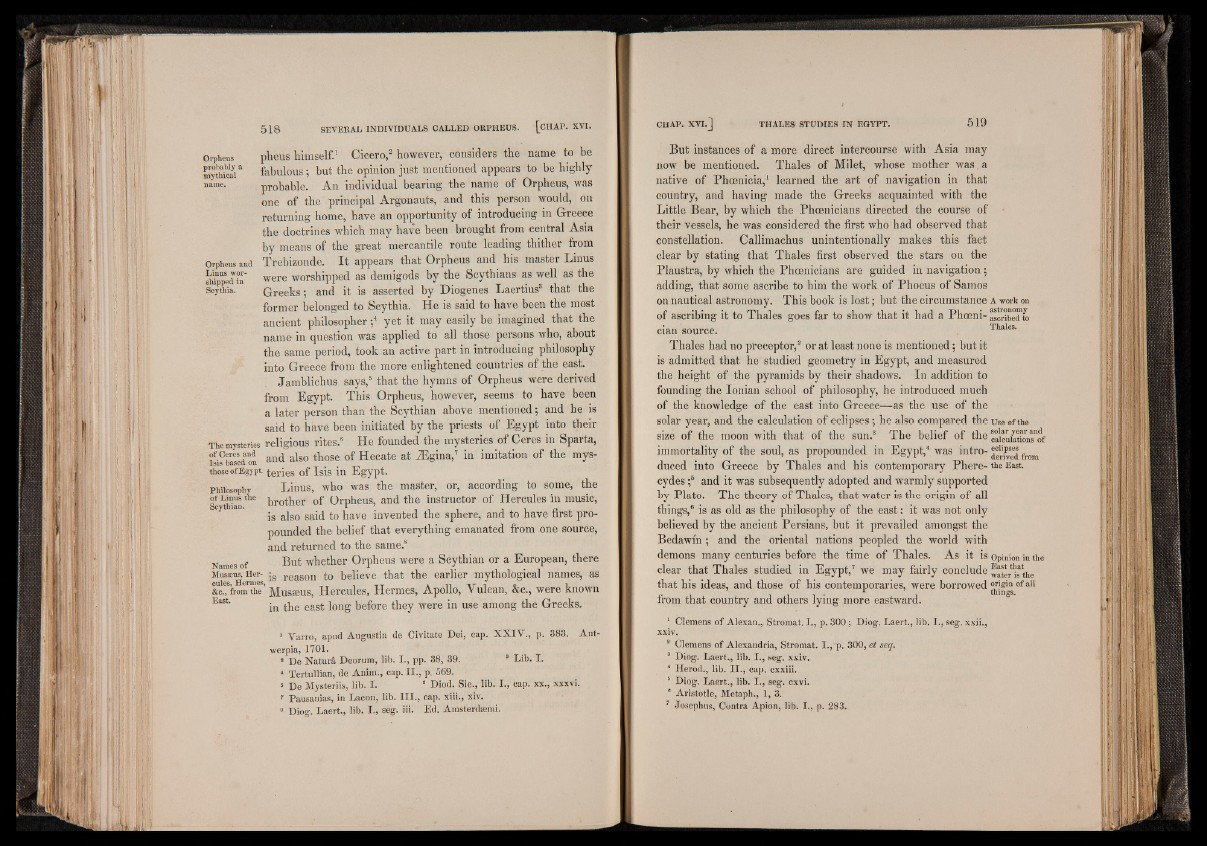
pheus himself.1 Cicero,2 however, considers the name to be
fabulous; but the opinion just mentioned appears to be highly
probable. An individual bearing the name of Orpheus, was
one of the principal Argonauts, and this person would, on
returning home, have an opportunity of introducing in Greece
the doctrines which may have been brought from central Asia
by means of the great mercantile route leading thither from
Trebizonde. It appears that Orpheus and his master Linus
were worshipped as demigods by the Scythians as well as the
Greeks; and it is asserted by Diogenes Laertius3 that the
former belonged to Scythia. He is said to have been the most
ancient philosopher ;4 yet it may easily be imagined that the
name in question was applied to all those persons who, about
the same period, took an active part in introducing philosophy
into Greece from the more enlightened countries of the east.
Jamblichus says,5 that the hymns of Orpheus were derived
from Egypt. This Orpheus, however, seems to have been
a later person than the Scythian above mentioned; and he is
said to have been initiated by the priests of Egypt into their
The mysteries religious rites.6 He founded the mysteries of Ceres in Sparta,
of Ceres Em<i and ajgo tpQSe 0f Hecate at vEgina,7 in imitation of the mys-
IS IS D&S6CL o n
those ofEgypt teries of Isis in Egypt.
Philosophy Linus, who was the master, or, according to some, the
^ Linus the brother of Orpheus, and the instructor of Hercules in music,
is also said to have invented the sphere, and to have first propounded
the belief that everything emanated from one source,
and returned to the same.8
Names of But whether Orpheus were a Scythian or a European, there
Musaius, Her- -g r e a Son to believe that the earlier mythological names, as
&c., from the yIuSit'US, Hercules, Hermes, Apollo, Vulcan, &c., were known
EaSt‘ in the east long before they were in use among the Greeks.
1 Varro, apud Augustin de Civitate Dei, cap. X X IV ., p. 383. Ant-
werpia, 1701.
2 De Natura Deorum, lib. I., pp. 38, 39. 8 Lib. I.
1 Tertullian, de Anim., cap. I I ., p. 569.
5 De Mysteriis, lib. I . ‘ Diod. Sic., lib. I., cap. xx., xxxvi.
7 Pausanias, in Lacon, lib. I I I ., cap. xiii., xiv.
8 Diog. Laert., lib. I., seg. iii. Ed. Amsterdmmi.
Orpheus
probably a
mythical
name.
Orpheus and
Linus worshipped
in
Scythia.
But instances of a more direct intercourse with Asia may
now be mentioned. Thales of Milet, whose mother was,a
native of Phoenicia,1 learned the art of navigation in that
country, and having made the Greeks acquainted with the
Little Bear, by which the Phoenicians directed the course of
their vessels, he was considered the first who had observed that
constellation. Callimachus unintentionally makes this fact
clear by stating that Thales first observed the stars on the
Plaustra, by which the Phoenicians are guided in navigation;
adding, that some ascribe to him the work of Phocus of Samos
on nautical astronomy. This book is lost; but the circumstance a work on
of ascribing it to Thales goes far to show that it had a Phoeni- ScribecUo
cian souree. Thales.
Thales had no preceptor,2 or at least none is mentioned; but it
is admitted that he studied geometry in Egypt, and measured
the height of the pyramids by their shadows. In addition to
founding the Ionian school of philosophy, he introduced much
of the knowledge of the east into Greece—as the use of the
solar year, and the calculation of eclipses; he also compared the useofthe
size of the moon with that of the sun.3 The belief of the caicluat^nTof
immortality of the soul, as propounded in Egypt,4 was intro- fro
duced into Greece by Thales and his contemporary Phere- the East,
cydes ;5 and it was subsequently adopted and warmly supported
by Plato. The theory of Thales, that water is the origin of all
things,6 is as old as the philosophy of the east: it was not only
believed by the ancient Persians, but it prevailed amongst the
Bedawin; and the oriental nations peopled the world with
demons many centuries before the time of Thales. As it is opinion in the
clear that Thales studied in Egypt.,7 we may fairly conclude toSh* the
that his ideas, and those of his contemporaries, were borrowed °r;Pn of aU
„ , ’ i i i - i things. trom that country and others lying more eastward.
1 Clemens of Alexan., Stromat. L , p. 300 ; Diog. Laert., lib. I., seg. xxii.,
xxiv.
2 Clemens of Alexandria, Stromat. I ., p. 300, et seq.
8 Diog. Laert., lib. I., seg. xxiv.
1 Herod., lib. I I ., cap. cxxiii.
8 Diog. Laert., lib. I ., seg. cxvi.
8 Aristotle, Metaph., 1, 3.
7 Josephus, Contra Apion, lib. I., p. 283.